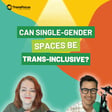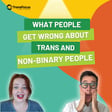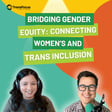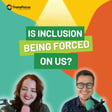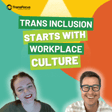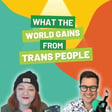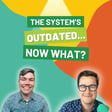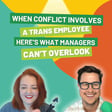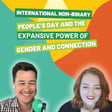Inclusive Hiring for Trans and Non-Binary People
00:00:04
Speaker
Welcome to the Gender in Focus podcast. I'm Elle and each week I get to ask Kai Scott, the president of TransFocus Consulting, all the questions you have ever wanted to ask about trans and non-binary people in the workplace and in the wider world.
00:00:18
Speaker
I'm a work in progress and don't want to point to the places where I'm weaker, right? i get it And it actually builds trust when you say, we're trying to figure this out.
00:00:29
Speaker
We're not done yet. And then when people get hired and inevitably bump up against things, they're not surprised. And they're also assured that this is on the organization's radar.
00:00:44
Speaker
you're more likely not only to get some very, very highly qualified people to want to join your team, but also that extends further out into cisgender people too, especially when it comes to sort of younger up and coming talent.
00:01:01
Speaker
What does it take to make your ah hiring process truly inclusive of trans and non-binary people?
Building Trust with Transparency and Efforts
00:01:07
Speaker
In this episode, we shine a light on what actually makes a difference from avoiding bias in job ads or interviews to respecting privacy during background checks and reference calls You'll hear surprising stats about the recruitment potential of trans candidates, along with what not to say, how to communicate your inclusion efforts clearly, and the thoughtful details that matter, like healthcare coverage.
00:01:30
Speaker
We'll also share personal stories and practical tips, because even if your process isn't perfect yet, there are still meaningful ways to show up with support. Let's move beyond fear and tokenism and start hiring with purpose.
00:01:44
Speaker
And I'm joined by my esteemed colleague, Elle. How are you doing today? I'm doing so well. How are you? Fantastic. I'm glad to hear that. I am also doing well.
00:01:55
Speaker
So um it's a sunny, beautiful day, even though there's lots going on in the world, still finding these little pockets of sunshine.
Recognizing Bias in Recruitment Processes
00:02:03
Speaker
I feel like that is, and so the fact that it's sunny for you today, it's rainy for me today here and I am delighted about it.
00:02:11
Speaker
So i feel, I feel very at home today. is it because it's, it's a cozier thing for you? um like I love cozy. I'm a cozy queen. Like when it's cozy and rainy, have my blanket on, though it's summer. and I'm loving it. I'm living the dream. oh Hey, I'm sure there are many others who would join you in that enjoying coziness. So, cool.
00:02:35
Speaker
So, ah recruiting. A lot of people, even when they're trying to be inclusive, when they're setting up their recruitment, they don't necessarily always realize how early bias can show up. So, how can how can that bias show up even before the candidate has entered the rooms?
Supportive Environment for Trans Candidates
00:02:53
Speaker
Yeah, so true. Hey, may not realize, but just, you know how, say, we've put up a job posting can provide early indication of you know, where an organization is at in their inclusion journey, even subtle words that people are using to talk about it, or the absence or presence of anti-discrimination statements.
00:03:16
Speaker
There's, you know all these little clues. And Certainly, transs and non-binary folks are generally fairly primed to seek out these subtle clues ah because unfortunately, it's very hard to determine where there is safety and maybe a lack thereof.
00:03:33
Speaker
And so these words and the way things are set up in a job description do matter.
Handling Assumptions in Interviews
00:03:38
Speaker
um Even how the website is set up can give some indication. um If, say, for example, there's only references to men and women in the workforce that says something about perhaps non-binary folks are not on the radar of this company. I don't think it's ever malicious exclusion. It's just afterthought or lack of thought.
00:04:01
Speaker
And so these things can ah deter somebody or they can encourage them based on what kinds of words are used within that. And and so it is important to to look at those things even before somebody comes in to to be interviewed for a job because but they may not actually apply because of how things have been worded or set up or not able to find clear indication of inclusion.
Collecting Inclusive Data
00:04:28
Speaker
let's say that somebody is recruiting, they've set, they've put out the the kind of application forms and they've got a lot of people who have, who are interested and somebody comes in and discloses that they are trans in an interview.
00:04:42
Speaker
but What would be the way that that you would want people to handle that? Because i I would imagine that a lot of people would immediately go, deer in headlights, don't know to do. Yeah, freeze in the moment. They're like, oh no.
00:04:55
Speaker
Even if they've they've gotten some education, they're trying to like... Rolodex that quickly back into their mind of like, okay, what did they say?
Demographic Data and Diversity Metrics
00:05:03
Speaker
Yeah, you um yeah I can appreciate that moment of like, oh, shoot, what do I do?
00:05:08
Speaker
How do I handle this? The easiest thing is to thank somebody because they're usually stating that for a particular reason. ah Sometimes people don't share and that's okay to honor that as well, right? We don't need to know. But if people do share,
00:05:24
Speaker
they're usually anticipating some sort of challenge. So it's good to thank them for sharing and also to follow up with, you know, if there's any supports that they need through the process.
00:05:36
Speaker
And in that way, there's an open-ended question That allows you to understand where they're at to say, oh actually, I anticipate this to be an issue or, you know, I'm worried about reference checks.
00:05:50
Speaker
I, you know, was fired by my previous employer because I was trans, right? So there's all these things that people are carrying with them or even just the fear of being discriminated against.
00:06:02
Speaker
And so that allows a little bit of space for that to be surfaced in the moment ah so that you can ensure specific supports along the way based on what they raised.
Safety and Inclusivity in Job Applications
00:06:13
Speaker
if it's just a matter of like, oh, I wanted to let you know nothing else, then that's cool too. And then you can just... You're going continuously be aware of things as they unfold and you know offer other options along the way as you you know maybe encounter things that you didn't expect.
00:06:30
Speaker
ah Say this person has two first names, a legal one, that's their past name, and a current one that's not legal that they go by on a daily basis.
00:06:42
Speaker
And so you might then be aware of that issue and be like, okay, I see you have two names. We only have one name field. Let's figure out a way, you know, to to handle this situation. So just being open and responsive, um but also matter of fact, you don't have to make it a big, huge deal.
00:07:00
Speaker
um It's more just now you're, this is on your radar ah to be ready to respond in the moment. You said something just then about how some people might not disclose
Equity and Inclusion Policies
00:07:12
Speaker
at all in the interview.
00:07:14
Speaker
If somebody suspects that somebody is trans, they've come into an interview and you suspect that they're trans, I imagine that would bring a lot of panic as well. And like knowing whether they should bring something up or whether they should avoid it entirely or whether they should...
00:07:28
Speaker
you know, what they should say or how they should not say things. So can you sort of go into that and like more around what we should not be doing when we suspect somebody's trans or if somebody is ah disclosing that?
00:07:39
Speaker
Yeah, absolutely. So sometimes people are what we call visibly trans, right? Not everybody is, but there are some for whom people can piece it together, maybe based on the shape of their body or ah number of factors or features.
00:07:55
Speaker
And so in that moment, people typically, if they're the ones interviewing or ah part of the hiring process, Typically, people want clarity. They want to know, what am I dealing with, right? That's a very common kind of inclination among humans.
00:08:10
Speaker
um I don't and think it's like a bad thing necessarily, but it is really important not to push
Appeal of Inclusive Practices to Younger Generations
00:08:17
Speaker
people past their comfort. And if somebody is not raising something like any other sensitive detail, we don't, um especially in an interview process where there is a power dynamic, right? The people interviewing have more power than the person being interviewed. It is, and it's also, there's a legal aspect to it.
00:08:35
Speaker
Obviously, I'm not a lawyer, so I can't speak to it specifically. But we're not asking people their gender, right? Are you a man or a woman that's just off the table? um Similar to are you pregnant or do you plan to be pregnant, right? So these types of things we want to be very sensitive towards.
00:08:52
Speaker
and also there are ways to subtly, without specifically stating it, um show ah support, right? One way to do that is to, doesn't have to be everybody, but maybe a handful of folks who feel comfortable, they can share their own pronouns, right? And then that signals, without calling it out, that this is a safe place where we exchange pronouns if needed.
00:09:16
Speaker
But we're, again, not forcing that person to provide their pronouns, and if they don't, then They are not
Legal Aspects of Personal Questions in Interviews
00:09:23
Speaker
inquiring. Most of the time in interviews, you're talking directly to the person.
00:09:28
Speaker
And so you're saying you, not he, she, they, or any other pronoun. And so it's just then being more direct in your communication. If you do you know have sidebar conversation with someone else, if they haven't provided the pronouns, I would just use they, them pronouns as a police holder until more is provided.
00:09:50
Speaker
And in that way, you can provide a relaxed environment where people can come forward to share more if and when they're ready. And that actually goes a long way to kind of holding back on one's own desire for certainty to show that person in tangible ways that it is a safe place for that to happen.
00:10:12
Speaker
And then it's not a kind of coerced thing and people can share when they're ready. And within the
Challenges with References and Background Checks
00:10:20
Speaker
interview process, really just focusing on their skillset and what they're capable of and what's required from the job is what's really at play.
00:10:29
Speaker
Certainly ah people, one of the things that has come up in court cases is, you know, publicly facing or client facing positions. People can be shy about hiring trans folks and you know, in one case that was deemed discriminatory, basically somebody wasn't going to hire somebody because they didn't know, they thought that their clientele would discriminate against the trans person.
00:10:56
Speaker
So they like preemptively discriminate against them. It's a bit confusing, but oh that's not allowed. And so just there, you may have to then, you know, if that person is selected based on their skillset and their qualifications,
Internal Inclusivity Before Recruitment
00:11:12
Speaker
then you may need to take some extra steps to help protect them in the workplace. If you anticipate some of the clientele being confused or not knowing or whatnot. So, but those are conversations that you can have at a later date um after the hiring process.
00:11:28
Speaker
You have already touched on this, but I wanted to go back to it because you mentioned, for example, sometimes people have a chosen first name and also a legal first name.
00:11:39
Speaker
So when we're collecting personal information during hiring, what kind of things can organizations think about? Or like, what what do they maybe need to be more thoughtful about when it comes to but it comes to that Absolutely. So there's a few different components to it.
00:11:55
Speaker
The first name being one aspect of that. So it gets a bit complicated depending on the organization and whether they're involving a third party for recruiting.
Resources for Employers and Job Seekers
00:12:08
Speaker
organizations will involve somebody to do the recruiting for them, which I appreciate. There's a lot of effort involved in that. And so may not have direct control over all of the things I'm about to say, but certainly can advocate with the recruiting agency because more often than not, it's on their radar. And so if you as the company and the client of that recruiting agency say, hey, this is not working, we need this, then they often um see the need for it and are able to change it. if an organization has their own systems, it's really important to ensure an inclusive hiring process, including the first name. So making sure people can record
00:12:49
Speaker
you know, their legal name and the name they go by on a daily basis. Some people say preferred name, others chosen name, you know, there's name to use. I like that because it's very clear. This is the label and it's okay. This is what I use when I'm interacting with this person. Then there is also typically, especially organizations that have either goals or objectives to do more hiring among different facets of especially marginalized communities. They're collecting demographic data to be able to monitor how much or not as much of of a particular group of people, which I
Trans Individuals’ Education and Potential
00:13:28
Speaker
then it puts people in a bit of a pickle, especially, say, trans and non-binary folks, because it then, people are so kind of torn between do I share information and it counts towards diversity higher?
00:13:43
Speaker
Or ah do I out myself and that complicates my hiring process? Or maybe even I don't get the job because I'm trans, right? yeah And so there is something to be said about thinking that process through more carefully.
00:13:59
Speaker
And we've certainly advocated for a broader question That doesn't require a specific outing in that way. So a broader question because, you know, I have diverse experiences and you can list the ones. And so yeah at least you have one box that people can check without having to say i am trans.
00:14:18
Speaker
And in that way, reduces, well, there's less likelihood of of discrimination. It's not eliminated. But so there's those kinds of things to think about.
Workplace Attractiveness to Diverse Demographics
00:14:28
Speaker
There is also other information that could be collected depending on the organization.
00:14:34
Speaker
Some already have started, but offering the option of sharing pronouns before somebody shows up. Some trans and non-binary people really like that because kind of takes out that awkward step of like when to share that, if to share that, how to share that. It's like already shared.
00:14:51
Speaker
And hopefully people are referring to that before the interview to know how to do that properly. so those are kind of three pieces that generally are collected. There's more that we can talk about a little bit later, but there's also things like collecting information about previous jobs and reference checks and whatnot, but that's another topic.
00:15:14
Speaker
oh We've been focusing quite a lot on this sort of hiring side of it, but from the sort of perspective of a trans or non-binary person, obviously they don't necessarily know all of this going into it, that there are all these things set up. So what kind of things are trans or non-binary people considering before they even hit apply on a job posting? Like what are they necessarily looking for?
00:15:38
Speaker
So, so many things. And of course it's not Facebook, every trans and non-binary person's radar, but if they're wanting to assess safety, they're looking at
Proactive Outreach to Trans and Non-Binary Communities
00:15:50
Speaker
you know how the job description is written, ah what's required, even kind of the tone and information about accessibility.
00:15:58
Speaker
And this is not just accessibility from like a disability perspective, but just general, broader accessibility. where you know if additional supports are needed, this is who you go to talk to, or here's a webpage on how to you know access those.
00:16:13
Speaker
So just a bit of forethought in terms of a smoother hiring practice, recognizing that not everybody has the same needs within a hiring process. And sometimes trans and non-binary folks are not just looking at whether gender diversity has been accounted for, but they're looking at what are you talking about in terms of Indigenous truth and reconciliation? Have you considered people with disabilities and their needs?
00:16:39
Speaker
And seeing kind of a broader approach to various needs. Obviously, if somebody is trans and ah person of color, trans person with disability, they need those that that full complete picture for therere for information to know if it's going to be a good hiring process.
00:16:58
Speaker
But also, if they're not a part of those communities, they they care whether something is being done.
Creating an Inviting Workplace
00:17:04
Speaker
And An organization that is dealing with all of these various matters or figuring out what they're going to do ah speaks volumes to the receptivity to knowing additional things that maybe aren't on their radar or knowing that perhaps there's already some things in place that it will be fairly smooth process. Or the very least, if there are issues, the people can bring them up without it being a big deal.
00:17:33
Speaker
I think I would definitely if I were looking for a job which I'm not if I were looking for a job and I i was looking and maybe they don't mention non-binary but I could see that they had considered disability they had considered kind of indigenous applicants and the the needs that they might have I would probably be more inclined to believe the best of them if they even if they hadn't mentioned non-binary issues I would be more inclined to think that they would consider it if I brought it up or you know what i mean so I definitely yeah get that They've already gone through a process and have kind of flexed those muscles, something where they've practiced it to then be more comfortable with additional things if they're not on their radar.
00:18:14
Speaker
Yeah, yeah, yeah. There's so many places that people are looking. They're looking to see if there's information about washroom access. They're wanting
Transfocus Resources and Practical Steps
00:18:25
Speaker
to have insight into whether the organization provides gender-affirming services coverage, extended healthcare care coverage, even if they don't need it for themselves, just the fact that it's there, that it's something considered and offered, coming out guidelines, anything to, again, even if they don't need them, that gives some sense of what type of work the organization has done.
00:18:50
Speaker
You were saying about, you know, the the guidelines just then, and essentially, how can organizations be upfront about their equity and inclusion practices, like the the you mentioned earlier like a link to a webpage talking about all of their policies or whatever, but like what does that actually look like on a wider scale?
00:19:08
Speaker
Yeah, it's really interesting. I find that organizations can, sometimes be shy about what they've done because they don't want to be seen as bragging or being like, look at how awesome we are. Right. We're so woke.
00:19:22
Speaker
Well, that too. Exactly. It's just like, they don't want to be seen like patting themselves on the back or anything of that vibe. But I will say that there's a way to do it. That is about transparency and many, many people,
00:19:40
Speaker
particularly people in younger generations, really appreciate transparency, even if it's not their topic or their need, right? They just want to know what's this
Conclusion on Inclusive Hiring Practices
00:19:50
Speaker
organization about.
00:19:51
Speaker
And typically, people do that in the values and the mission statement, and those are important, and it's good to put those out there and that include, you know, statements about equity, diversity, and inclusion, or You know, even if you don't want to use those words specifically, you know, being supportive of one another or, you know, whatever language people want to use. And also to spell out the specifics of what that means.
00:20:14
Speaker
And you just, you can be matter of fact, where like we do this, this, this, and this. Maybe you don't provide all the detail, but just something to point at, whether it's on trans and non-binary issues or trans.
00:20:25
Speaker
more generally, but these are the things that we've worked on. These are the things we're not done with yet. That, to be honest about not being done, is actually really powerful. And I i know what so some organizations are self-conscious about not being done, and don't tend to, don't if it's hiding, but want to not showcase that. I get it. You know, i I'm not a, you know, I'm a work in progress and don't want to point to the places where I'm weaker. Right.
00:20:56
Speaker
i get it. And it actually builds trust when you say, we're trying to figure this out. We're not done yet. And then when people get hired,
00:21:07
Speaker
and inevitably bump up against things, they're not surprised because you've like already indicated. And they're also assured that this is on the organization's radar. like They don't have to do the effort of bringing it up to be like, hey, I don't know if you know, but x y and Z.
00:21:27
Speaker
They'd be like, oh, no, they've already said on their website, you know, they're dealing with this. And I can, it's maybe annoying or upsetting, but ah there's a hope of something being different.
00:21:39
Speaker
And that is actually, that builds trust in ways that maybe is a bit counterintuitive. But I always encourage that to to spell it out.
00:21:50
Speaker
I think it's so much easier to give grace when you can see that there's an effort being made. I think that that would be surprising to hear though. I can see that a lot of orgs, maybe you wouldn't want that to spell it out that they're struggling a bit.
00:22:04
Speaker
Yeah. And I think organizations hesitate to then also put a timeline on it, right? Because sometimes timelines are kind of difficult to determine or figure out and,
00:22:16
Speaker
there is interest in knowing timelines for trans and non-binary folks. you know Are we talking about months, years, decades? So, I mean, people ah or organizations can try out different things and see what the response is. And ah will say that many trans and non-binary folks talk amongst themselves, whether person to person or online about companies.
00:22:43
Speaker
So there's information being disseminated about organizations and people are actively looking for safety and as much as possible that an organization can share that.
00:22:58
Speaker
And you don't have to do a press release, just having a space on the webpage or ah something like a handout that can be provided, you know, a number of different vehicles for that.
00:23:10
Speaker
So once you've established that you're going to hire somebody and you're doing all the kind of next steps, there are things that seemingly are pretty obvious and that everybody has to deal with, which would be, for example, getting references together amongst other things. But that kind of thing has like an extra layer of complication for for trans people. and I was wondering if you could explain that a bit.
00:23:32
Speaker
yeah such ah an important consideration. It may not be on the radar of many either human resources or hiring committees. And that is the reality of of having been employed with different names.
00:23:46
Speaker
And so this kind of sensitive detail, especially if somebody has already changed their name legally and really doesn't want to share generally doesn't want to share their past name ah comes with a lot of pain for many because it's you know like people were not understood for who they are and there was a name attached to it that was used thousands tens of thousands of times in their lives you know so it people can you know, they have varying relationships to it, but generally you want to avoid it. And so having to go back to employers where the previous name was used can present an extra layer of challenge, especially if it's kind of more distant past.
00:24:31
Speaker
Generally focus on the more current employment when doing this type of reference check. But if there's a particular skill set that you did in one job that was a little bit more in the distant past that can present a challenge because you have to circle back to that employer, tell them that you have a different name, potentially even explained with being trans, and you don't know what kind of response that will generate on that end. right Everybody is up to speed or understanding or maybe even hostile of trans folks.
00:25:02
Speaker
And so then that can impact the type of reference they provide. And so this is like awful dynamic and it's not just that possible dynamic, but it's actually thinking it through and just the emotional labor of like trying to anticipate what will happen and kind of jumping into the unknown. And so it puts them in a pickle. And course, references are important. I'm not suggesting that they not be done properly.
00:25:27
Speaker
But I think it's working collaboratively with the trans or non-binary person um to say, hey, I appreciate that, you know, references might be a bit tricky for you or could be tricky. Don't want to, you know, conclude that it's always tricky. It might be really simple for people.
00:25:43
Speaker
But just opening the door to thinking through, you know, which references if they if you there's a particular thing, your skill set or qualification you're really interested in, you know helping them through thinking which ones to prioritize.
00:25:57
Speaker
And then also being ready to receive references and that are negative, understanding that there might be some bias in there. right? And not to take them completely at face value. And it's not to say that there aren't problematic trans and non-binary employees, right?
00:26:13
Speaker
But you have to kind of weigh these things a little bit more. So um because there might be these additional factors. And like, are there any other areas? I don't know what really is involved in in this kind of process. So is there other things like I'm imagining, I don't know, like, police checks or like, are there other areas that this comes up?
00:26:33
Speaker
Yes. background checks are big other challenge for trans and non-binary folks and understand why background checks are necessary, especially with folks who are working with kids. Like that's critical. Of course. We need to do background checks.
00:26:52
Speaker
And this is requiring folks to, in many cases, go to the police, right? Get fingerprinted and provide their past name.
00:27:03
Speaker
Like that's a standard part of background checks and in the way that, uh, folks, the hiring, ah the people on the hiring committee or an ah HR will get somebody's past name, even if that person has changed their name legally.
00:27:21
Speaker
So you will get you would be privy to very private information ah by receiving that background check or the results of that background check. And also there are um a lot of challenges with police.
00:27:37
Speaker
for trans and non-binary folks, whether they've asked for help from the police. And then there's not a lot of training among police officers on how to interact respectfully with trans folks and rely heavily on IDs. And so there might be a past difficulty slash trauma, especially I would say um trans people of color. There's that added layer of like now having to go to police where perhaps there's this past that really presents a challenge for them to go to to to police and fingerprinting too.
00:28:08
Speaker
And so there's just these these layers that need to be understood, one, and then ah considered as well to say, just just to let you know, and I like to kind of outline that.
00:28:19
Speaker
Most job descriptions tend to add that in there, but maybe even some reference in the job description that you know the employer is willing to work with an individual on a background check. You don't have to say because of trans ah or non-binary folks, but just generally that There's that openness to to talk about it and ah to figure out a way that can really bring down a lot of the anxieties that folks have about this particular step.
00:28:46
Speaker
So again, just offering to say, hey, there's a background check as part of this. I can appreciate that. That might bring up a past name that you have you may have. And just to let you know, we have privacy features in place where only one person in the hiring committee gets that result, right?
00:29:07
Speaker
So we're not sharing that with everybody else to be like, oh, did you know Tanya used to be Tom? You know, that kind of salacious detail, kind of a bit on the gossipy side of things, which that clouds things within the hiring process rather than just one person gets it and they deal with it in a matter of fact way and and that's it.
00:29:27
Speaker
And that can actually create a lot more trust with the the trans person or non-binary person being hired. to know that, okay, these people understand the gravity of this process and they have certain mechanisms in place and they've approached me with sensitivity And I don't like it, but here we go and we're going to do it. Right.
00:29:48
Speaker
So, yeah. We've been talking a lot about the struggles and the sort of negative aspects of hiring ah for for trans and non-binary people, but there are some really great stuff too.
00:29:59
Speaker
And I was wondering if you could go into that, like the real positives about experiences or, or even just why trans and non-binary people are ah people worth considering when it comes to hiring.
00:30:10
Speaker
Yeah, absolutely. That's ah so important to understand that, yes, there's a few extra steps or considerations, but actually, We know from stats collected among 27,000 trans folks that the majority of them are highly educated and, of course, don't and just need to be highly educated to be employed, obviously, but there are folks who, disproportionate to the population, two more times educated compared to the general population.
00:30:43
Speaker
So I don't know why that is. We'd have to dig a little further to see. um Perhaps we have a bunch of overachievers. I don't know. but um yeah.
00:30:54
Speaker
So I think sometimes people are surprised by that stat. It's this ah mixture of really educated and vastly unemployed.
00:31:05
Speaker
So because of discrimination and You know, there's like a 15% unemployment rate among trans and non-binary folks. So three times that of the general population. Yeah, it's high and maybe increasing. Like we don't have recent stats. So especially with what's going on now.
00:31:23
Speaker
And so there's this like highly educated, untapped talent that if organizations are able to ah adjust a few things here and there, or just be considerate, they actually can access.
00:31:39
Speaker
And what we find is that if one trans person has a really good experience, they tend to spread that to be like, oh my gosh, at this organization, Like it doesn't even have to be that big.
00:31:51
Speaker
People like they just thought about this thing. And then I was like, holy, I've never had that experience, you know, and that spreads white like wildfire and then can then tend to have other people apply to. Right.
00:32:05
Speaker
Or that you have gender affirming health, extended health care benefits. That's hugely motivating um to many people. So there are these kind of positive aspects beyond that, you know, like many people, hardworking, creative, of course, it's not everybody, like we become in all different shapes and sizes and abilities. But I do find that ah because trans and non-binary folks tend to be discriminated against and
00:32:40
Speaker
probably cast out a lot there is a tremendous amount of resilience where no matter the issue or the problem that's being solved in their role there is a persistence to figure things out and not to take the status quo it's like thinking outside the box and coming up with different ways of doing things that perhaps weren't thought of and so there's a lot of potential especially for innovation um Yeah.
00:33:10
Speaker
So I think there's a tremendous amount of it benefits. There's a lot of gifts that trans and non-binary folks have to share with everyone else. I read a stat and I can't remember any of the details of it so hopefully you do but I read a stat about how especially millennial and Gen Z employees regardless of whether they are trans themselves and we we have mentioned this earlier but the more inclusive an environment is like it's one of the top things that they're looking for in future employers so
00:33:41
Speaker
If you are sort of leveling up when it comes to trans and non-binary people, you're more likely not only to get some very, very highly qualified people to want to join your team, but also that extends further out into cisgender people too, especially when it comes to sort of younger up and coming talent.
00:33:57
Speaker
Very much so. I'm trying to remember the specific stat. I think it there were different questions. There was, you know, the, are you wanting an inclusive workplace?
00:34:08
Speaker
Or no, there was, do you know somebody with gender neutral pronouns? That was 40%, around 40% knew somebody with gender neutral pronouns. Really? Yeah. yeah it's And it differs between millennial and Gen Z. I think it's a bit higher for Gen Z. Mm-hmm.
00:34:25
Speaker
And then there was, do you expect or want gender neutral washrooms within the workplace? And that was like 73%. They're like, this is a no brainer.
00:34:37
Speaker
Yeah, you gotta have it. Like, let's get on it. That's super exciting. So, um and then I think there were a few other questions that I can't remember off the top of my head, but essentially, no matter the question, it's overwhelming connection, understanding, and you know, expectation for inclusion.
00:34:58
Speaker
and And this is for mostly cisgender folks that are being surveyed there. So it's worth noting because it's it's maybe a bit quiet now where it's maybe requests and then if they're ignored, then either people leave or their requests become stronger, you know, shift into demands and, you know, unnecessary, you know, tussle on this issues. Yeah. issue um Yeah.
00:35:25
Speaker
When you could just, oh, thank you for sharing and let's figure something out rather than like waiting for a bunch of harm and frustration to to materialize.
00:35:37
Speaker
um I have run out of questions in my head. Are we good? Is there anything I've missed that you really want to talk about? the ah There's one thing. Generally Transfocus, we don't talk a lot about recruiting and it's actually very intentional.
00:35:54
Speaker
And it's not because we don't want, obviously that's the whole kind of where we're angling. We want trans and non-binary folks to be hired, obviously. However, because there's so many different areas where trans and non-binary folks bump up against challenges or structural limitations or cultural interaction-based issues, we tend to encourage organizations fix first and then look inward and then look outward.
00:36:27
Speaker
odd Right. And, you know, there's some degree that you can do both at the same time. They're not mutually exclusive. But I tend to encourage at the very least to understand what the issues are so that you're not kind of surprised when a trans person comes in and has a bunch of problems.
00:36:45
Speaker
And then that also ensures that you're not making the trans person the problem. That can sometimes happen where it's like, oh, it seems like a you thing rather than an us thing. And so we just just look around, take a bit of an audit to really ensure that, you know, at least your house is beginning to be prepared and then look outward include folks.
00:37:09
Speaker
to include folks I also encourage, especially if one's house has been prepared, speaking of cozy, making it inviting and welcoming.
00:37:22
Speaker
It's also about going to specific places. I find a lot of organizations are like, well, we we posted this thing. And I'm like, well, yes, some people might see it, but are you reaching out to you know specific organizations with that information? right Either LGBT job posting sites or there are job fairs that go on.
00:37:48
Speaker
um There was one in Toronto a few years for trans and non-binary folks specifically. And, you know a bunch of organizations came. It was really lovely. um And it's a good way to connect with the community, to know what's happening, to talk to people, to get to know folks.
00:38:04
Speaker
And there's just so much more benefit than just hiring folks from interacting in that way. So definitely looking out for those opportunities, I think is really key. So those are just a few other tips to to be not just waiting for folks, but to be actively reaching out within their circles.
00:38:24
Speaker
We have a ah resource that I will link in the show notes. Yeah. So at thriving at work resource is specifically for trans and non-binary folks, because we totally appreciate it.
00:38:38
Speaker
It's so daunting to get a job as a trans person. There's so much at play and it's just like, how do you even approach this in a, in a way that feels empowering impactful?
00:38:50
Speaker
How can you know what to ask for and you know what you can let slide? So we've got a bunch of information that helps folks who are seeking a job in terms of where to go ah to to find those inclusive employers, ah what to look for you maybe don't know, you didn't go to an LGBT job post, but you found a really interesting job and, you know, what are some of the things that you can look out for to see what kinds of work the organization has done.
00:39:21
Speaker
And um a bunch of other kind of supports as well, recognizing that there's a lot of labor involved to this and being in a community of people who are maybe going through similar things can really help with that. So we've put that all together to help out trans and non-binary folks recognizing that that challenge that they face.
00:39:43
Speaker
You also have a resource for employers and I was wondering if you could explain that a bit. Ah, we've set up a resource or created a resource that just has a bit of more detail around, you know, reference checks and background checks and how to set up job posts well.
00:40:00
Speaker
um And so it just gives you a bit of the tips and the tools of how to do that. And I'm trying remember how long it is, but, you know, it's got quite a bit of detail and just allows for that forethought.
00:40:13
Speaker
um And again, it's not that much extra effort, um but at the very least to have these things on the radar, especially for human resources folks and um hiring managers or whatnot. So think that'll be hopefully a very useful um resource for them.
00:40:33
Speaker
Amazing. ah Cool. Is there anything else? Have I missed anything? No. Okay, sweet. Yeah, it was good to to go through recruiting. It's, yeah, there's many pieces to the puzzle, but hopefully enough for practical steps forward to help folks to be hired because, yeah, we're we're good employees.
00:40:58
Speaker
Great. Well, thank you so much, Kai. um See you next week. Yeah, thank you. Bye for now.

